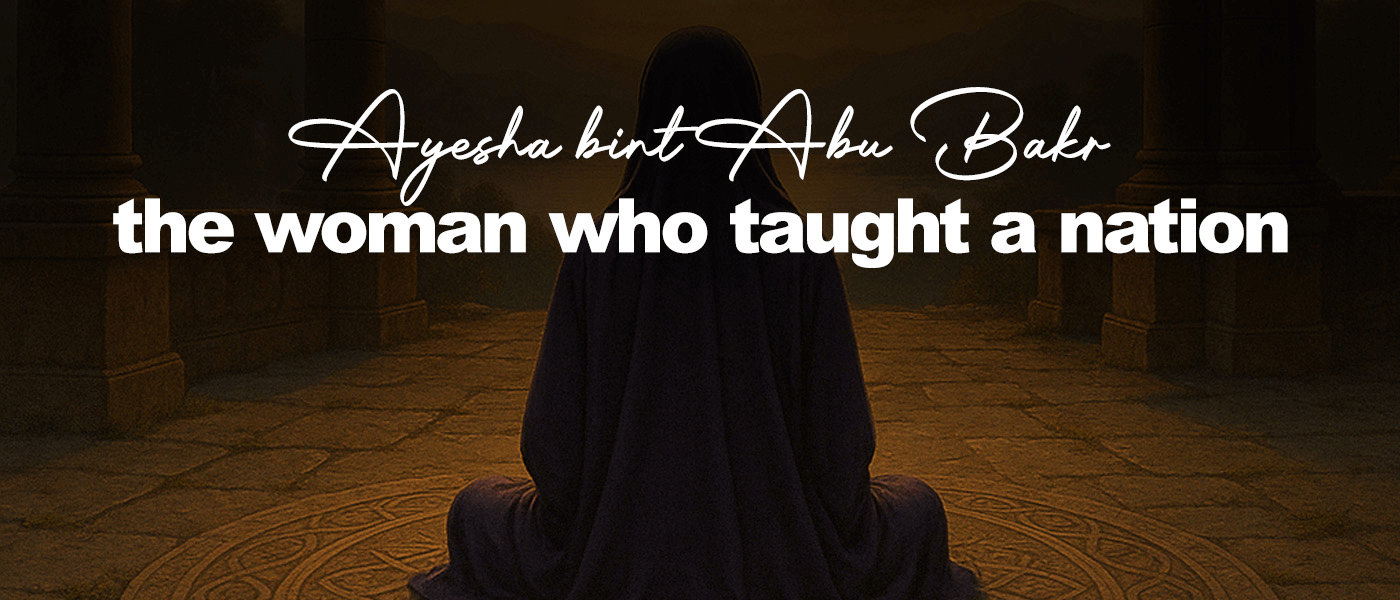
Among the most influential women in Islamic history is Ayesha bint Abu Bakr, the beloved wife of the Prophet Muhammad (SAW) and daughter of Umm Roman Zainab and Abu Bakr al-Siddiq, the first caliph of Islam. Her life stands as a testimony to the deep involvement of women in Islamic scholarship, piety, and leadership.
Ayesha bint Abu Bakr was born in Makkah around 613 CE, into the noble tribe of Quraysh. Her father, Abu Bakr, was among the earliest and closest companions of the Prophet (SAW), and a man of immense integrity and piety.
She was betrothed to the Prophet Muhammad (SAW) at a young age and entered into marriage with him in Madinah. Per her narration, Allah’s Messenger (SAW) said (to me), “You were shown to me twice in (my) dream. Behold, a man (Angel) was carrying you in a silken piece of cloth and said to me, ‘She is your wife, so uncover her,’ and behold, it was you. I would then say (to myself), ‘If this is from Allah, then it must happen.’” (Bukhari 7011) Their relationship was marked by love, mutual respect, and a shared commitment to the message of Islam.
Despite facing slander and accusation during the infamous incident of al-nafk, where she was falsely accused of wrongdoing, Allah (SWT) revealed verses in Surah An-Nur saying, “Indeed, those who came up with that outrageous slander are a group of you. Do not think this is bad for you. Rather, it is good for you. They will be punished, each according to their share of the sin. As for their mastermind, he will suffer a tremendous punishment.” (The Clear Quran®, 24:11)
Her steadfastness during this trial reflected her immense trust in Allah (SWT) and emotional strength.
Ayesha bint Abu Bakr was unique in many ways. She was the only wife of the Prophet (SAW) who had never been previously married, she was a born Muslim and daughter of two of the Prophet (SAW)’s most trusted companions, and she was the only wife in whose bed the Prophet (SAW) received revelation. But what distinguished Ayesha bint Abu Bakr above many others was her ilm, or knowledge. She was a scholar of the highest caliber, having learned eagerly from the Prophet (SAW).
She lived with the Prophet (SAW) for nine years until his death, which occurred in their home and in her arms – where he chose to take his last breath. “Amr bin Al-‘As said to the Messenger of Allah (SAW), ‘Who is the most beloved of the people to you?’ He (SAW) said, ‘Ayesha.’ He asked, ‘From the men?’ He (SAW) said, ‘Her father.’” (Tirmidhi 3886)
After the Prophet (SAW)’s passing, Ayesha bint Abu Bakr became a central authority on hadith, jurisprudence, and Quranic interpretation. The great scholar al-Zuhri said, “If the knowledge of Ayesha were to be gathered and compared to the knowledge of all the other wives of the Prophet and all the other women, her knowledge would be greater.”
Her home in Madinah became a place of learning for the companions and succeeding generations. She answered legal questions, gave fatwas, and corrected misunderstandings about religion, even challenging senior companions when needed.
Ayesha bint Abu Bakr also played a role in the political events following the death of the Prophet (SAW). During the caliphates of Umar ibn al-Khattab, Uthman ibn Affan and, later, Ali ibn Abu Talib, she was involved in matters concerning justice and leadership. Her strong personality made her a leader in knowledge, society, politics, and warfare. Though she later regretted her role in conflict, she lived to restore her place as the most esteemed woman of her era.
Ayesha bint Abu Bakr passed away in Madinah in the year 678 CE (58 AH) and was buried in Jannat ul-Baqee near other members of the Prophet (SAW)’s household. Her legacy continues through the volumes of hadith she narrated, her interpretations of The Quran, and her role as a teacher to the generation of scholars who followed. Her life reminds us that Islamic scholarship and piety are not limited by gender, and that women can be powerful conveyors of knowledge and faith.
After Khadijah bint Khuwaylid and Fatimah Az-Zahra, Ayesha bint Abu Bakr is regarded as the best woman in Islam and remains a role model for Muslims today. Her courage, knowledge, and devotion continue to inspire scholars and seekers of truth. She exemplified how faith, intellect, and strength can come together to leave a lasting legacy in the path of Allah (SWT).
To learn more about the life of Ayesha bint Abu Bakr, consider checking out the below books:
- The Wives of the Prophet Muhammad — Ahmad Thompson
- Aisha — The Wife, the Companion, the Scholar — Resit Haylamaz (also available in Spanish)
- Kitab At-Tabaqat Al-Kabir Volume VIII: The Women of Madina — Aisha Bewley



